Assassin's Creed Mirage for Xbox review: A short, familiar adventure worth sneaking into
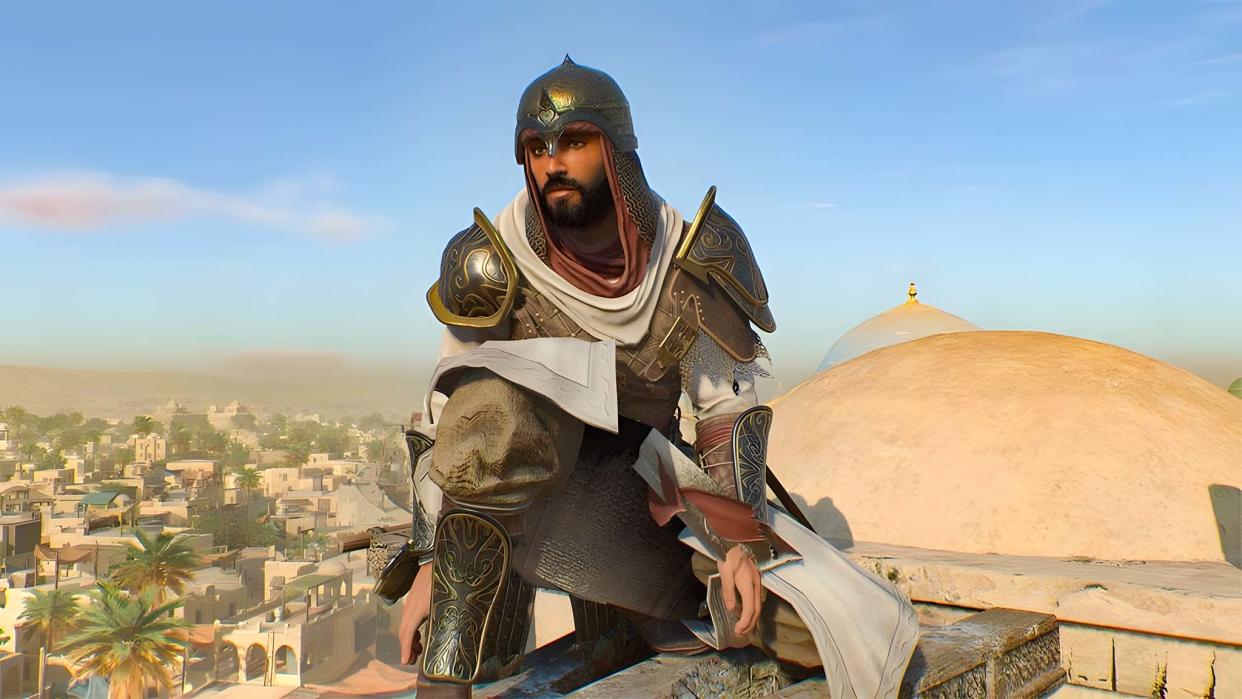
Quick menu
1. Story & characters
2. Visuals & performance
3. Gameplay & content
4. Accessibility
5. Final thoughts
Assassin's Creed is one of the most well-known franchises in gaming at this point. With the release of its latest installment, Assassin's Creed Mirage, there are 13 main games total that have been released since 2007. In its history, the Assassin's Creed series has seen some significant ups as well as major downs, with many fans arguing that the latest games have gotten too large and deviated too much from the original titles. As such, developer Ubisoft Bordeaux has sought to rediscover Assassin's Creed's roots by reducing the estimated playtime in Mirage to 20 to 30 hours and making this game more aligned with the originals.
The effort has been well implemented, but Mirage doesn't bring anything new to the table either. Plus, being a prequel to Assassin's Creed Valhalla shoehorns the story and keeps it from really soaring. Still, it's an Assassin's Creed game, which means that gameplay and mechanics are familiar and fun in the way the series has always been.
Disclaimer: This review was made possible by a review code provided by Ubisoft. The companies did not see the contents of the review before publishing.
AC Mirage: Story and characters
Assassin's Creed Mirage
Price: $49.99
Developer: Ubisoft Bordeaux
Publisher: Ubisoft, OWO
Genre: Action/Adventure
Install size: 40 GB
Playtime: ~20 hours
Release date: Oct. 5, 2023
Platforms: Xbox Series X|S, Xbox One, Windows PC, PlayStation 5, PlayStation 4, Amazon Luna
Xbox Game Pass: No
Reviewed on: Xbox Series X
If you've already played Valhalla, then you should be acquainted with Mirage's main hero, Basim ibn Is'haq. He is a prominent character in the Viking game who introduced protagonist Eivor to The Hidden Ones (the group that would come to be known as the Assassins in later eras). It's important to note that Mirage is a prequel to Valhalla, taking place in 861 CE between Bayek of Siwa's Assassin's Creed Origins (49 BCE) and Eivor Varinsdottir's Assassins' Creed Valhalla (872 CE). You don't necessarily need to have played Valhalla to enjoy Mirage, but certain things that get alluded to as the story unfolds will definitely make more sense if you have.
Within Mirage, we experience Basim's origin story as a young street thief in 9th-century Baghdad who is tormented by a Jinni in his frequent nightmares. With the help of his best friend, a woman named Nehal, Basim works to prove himself to the Hidden Ones who move about in his city. But in his efforts to do so, Basim gets tangled up with the horrible doings of The Order of the Ancients (The Order). Shortly thereafter, he becomes a Hidden One and works to rid the world of The Order's oppressive leaders while learning more about himself and his beliefs. It's a good premise, but the game doesn't always carry it out very well.

More Xbox games

- Best Xbox Controllers
- Xbox Series S xScreen is official
- Lamplighters League review
- Find every Moonstone in Lies of P
- Xbox games with 120 FPS
Anyone who has played an Assassin's Creed game knows that the plots can get rather complex and confusing regarding how these fictional historical protagonists tie into the current-day conflicts between the Assassins and the Knights Templar. However, unlike many other Assassin's Creed games, Mirage has no modern-day aspect as players spend the entirety of the game in the ancient world. I prefer this as there is no jarring timeshift, and I can focus on the story and characters that I actually care about. But this doesn't mean that Mirage's characters or plot are perfect.
Among the many characters players meet in Mirage, some of the most important are the various members of The Hidden Ones that Basim comes to know at Alamut, the stronghold from Assassin's Creed lore. This includes Roshan, Basim's tough master. Additionally, players also get to meet the historical figure, Ali ibn Muhammad, whom Basim works with on several occasions while igniting a revolt. However, for the most part, Basim's relationships feel strained and distanced to the point of making it hard for me to care about them. Now, Basim is intended to be a conflicted character, but the way the game shows it sometimes makes him seem annoying rather than relatable. This might be the intended point, but it's still odd to play.
More often than not, his strained relationships stem from Basim's inability to own up to his own mistakes combined with his relentless need to hypocritically point out his moral superiority to his companions, such as chiding someone for killing another person or claiming to an outsider that The Hidden Ones don't do anything to harm the innocent. But his statements always ring hollow, considering he frequently does activities that make him no better than his adversaries, pickpocketing random civilians in the streets or killing people who get in his way.
Even if you're trying to play a more respectable Basim, the main missions will require you to do these things at some point. I don't have anything against these in-game actions; it just feels weird that the game seems unaware of itself and makes you feel bad for playing the way it intends you to.
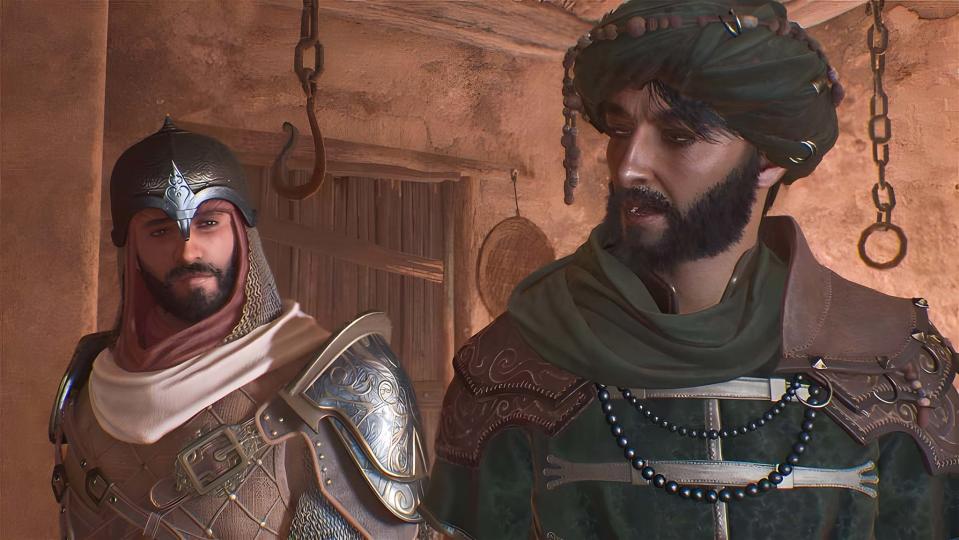
It took me a little under 20 hours to see credits roll in Mirage, but if I worked on completing all side quests and collecting all the extra items, I'm sure I could get another five to 10 hours out of it. This is far more contained and manageable than Valhalla's 60-hour playthrough, which I appreciate. Plus, it prevents the game from getting too repetitive.
There are five Members in The Order that you must unmask and then assassinate. In order to learn these people's identities, you'll need to eavesdrop on civilians, search for clues around the city, and complete various quests. Once enough is known about a Member, you can work on taking them out, which usually involves infiltrating a secure area filled with guards. Once the assassination has been done, you'll need to flee the area and melt back into the city before moving on to the next Member.
Usually, the game is pretty straightforward in letting you know what missions are available next, but there were a few times when I wandered around, unsure of what to do until a new clue was discovered. This approach makes the game feel a bit more natural exploration-wise but also feels undirected when so much of the game centers around following waypoints and looking at the compass.
It took me a little under 20 hours to see credits roll in Mirage, but if I worked on completing all side quests and collecting all the extra items, I'm sure I could get another five to 10 hours out of it.
Something I've liked about past Assassin's Creed games is that they gave me reasons to dislike my adversaries, so I felt good about defeating them. However, Mirage often doesn't provide enough context surrounding Members of The Order to make their assassinations feel justified. Sometimes, it is only in the quick rehash right before an assassination that I learn why I am taking them out rather than having picked up on it during the natural course of leadup missions. There was even one Member I related with and felt Basim was in the wrong for killing.
Moreover, as is usually the case with prequels, Mirage's plot is shoehorned into fitting into the sequel, Valhalla. I won't elaborate to avoid spoilers, but I will say that the need to fit into Valhalla does make the ending to Basim's tale feel forced and contrived.
AC Mirage: Visuals and performance

Overall, Mirage looks gorgeous with its intricate city designs and polished textures. At the start of the game, players are shown a settings menu and can choose between having the game focus on High Framerate or Quality visuals. This choice will help determine exactly how the game looks and performs on Xbox. If you change this setting, though, you'll need to allow the game to restart before continuing. As expected, the game runs very smoothly when focusing on keeping near 60 FPS, but some of the visual details aren't quite as polished. I spent most of my playthrough focusing on High Framerate, but this didn't prevent me from encountering several visual and performance issues.
Before diving into specific bugs, I will caveat this next section by saying that Ubisoft has officially stated that it is "still focused on fixing last known issues to provide the most qualitative experience possible" in Mirage. As such, some patches and improvements could fix the things I discussed here by launch or shortly thereafter.
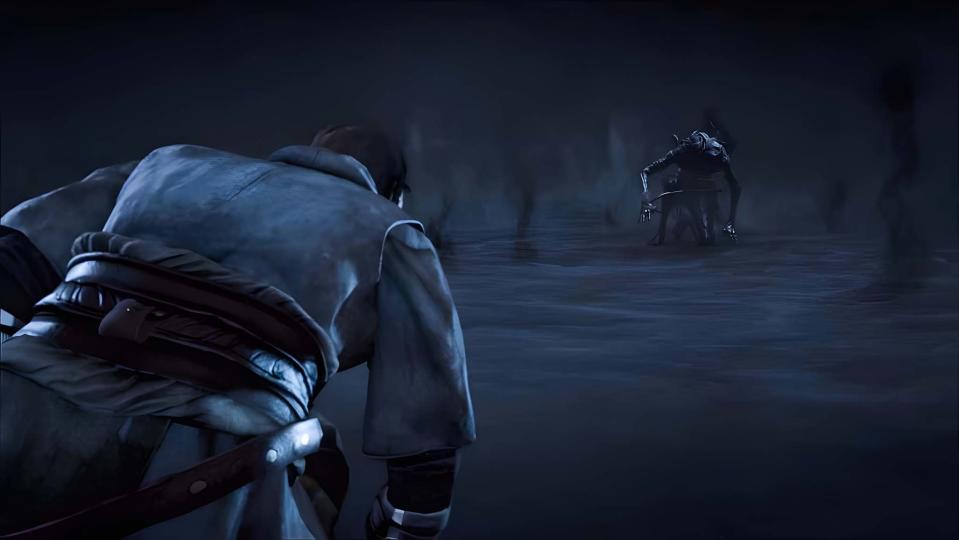
During my playthrough, characters' voices were always notably off from their mouth movements regardless of how many times I restarted the game or my Xbox Series X. As you can imagine, this was a somewhat offputting thing to see for my entire playthrough. Hopefully, a fix is in one of the first released patches.
Additionally, at three separate points, I encountered bugs that were so bad that they caused the game to crash. For instance, there was a stretch when the game thought my health was at 100% when it was really around 50%, and I could not eat food or take elixirs to heal up. After running around like this for a few minutes, the game suddenly froze and shut down.
At three separate points, I encountered bugs that were so bad that they caused the game to crash.
In another instance, enemies relentlessly followed me and wouldn't stop looking for me even when I was hidden. This prevented me from moving on to the next part of the game, which required that I be anonymous in order to interact with a critical location. Once again, the game eventually crashed. The good news here, though, is that each time the game crashed, I was brought to precisely where I had been when I booted the game back up, so there wasn't a ton I had to replay.
Aside from those instances, the game worked well without stuttering or awkward rendering. I found myself frequently drawn in by the splendor of the game, opening Photo mode to capture beautiful pictures of the desert and ancient Baghdad.
AC Mirage: Gameplay and content
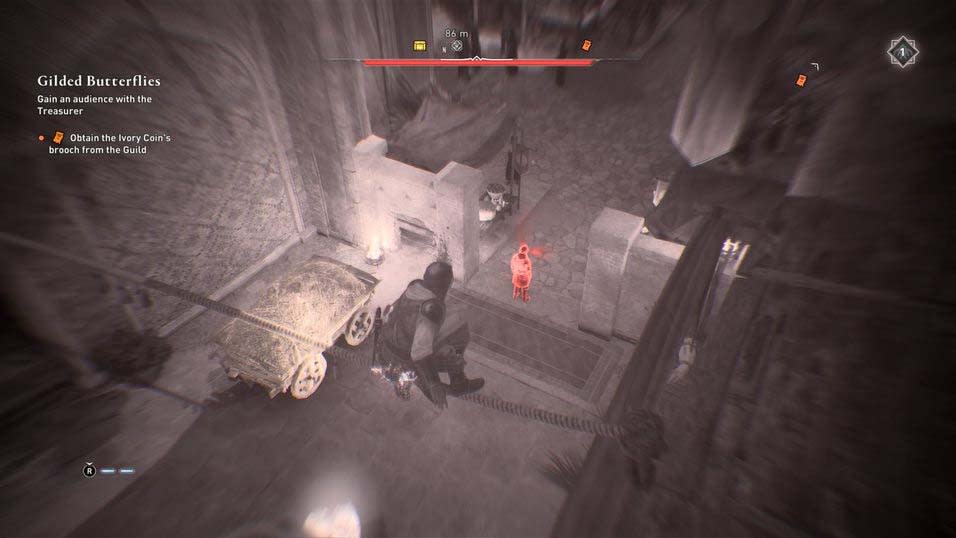
The best thing I can say about Mirage gameplay is also the worst thing I can say about it — it plays exactly like an Assassin's Creed game. There aren't any new mechanics, so gameplay and controls feel familiar and somewhat tired. As such, get ready for a decent number of fetch, stealth, pickpocketing, and assassination quests, all performed with the same repetitive mechanics. There are also plenty of follow quests, which I dread more than others because they require you to travel with a frustratingly slow NPC as they wander through a busy street or across a desert while taking far longer than you would on your own. It all feels like a rehash of the same base mechanics we've experienced in Assassin's Creed games for several years.
If you like the way previous Assassin's Creed games have played, then you'll likely enjoy Mirage.
As I previously stated, one point of Mirage has been to bring Assassin's Creed back to its roots, so this likely has to do with the lack of innovation. That all being said, there's something satisfying about these mechanics, which is why they have stuck around for so many years. It just would have been nicer if they had had more of an updated flare. So, if you like how previous Assassin's Creed games have played, you'll likely enjoy Mirage.
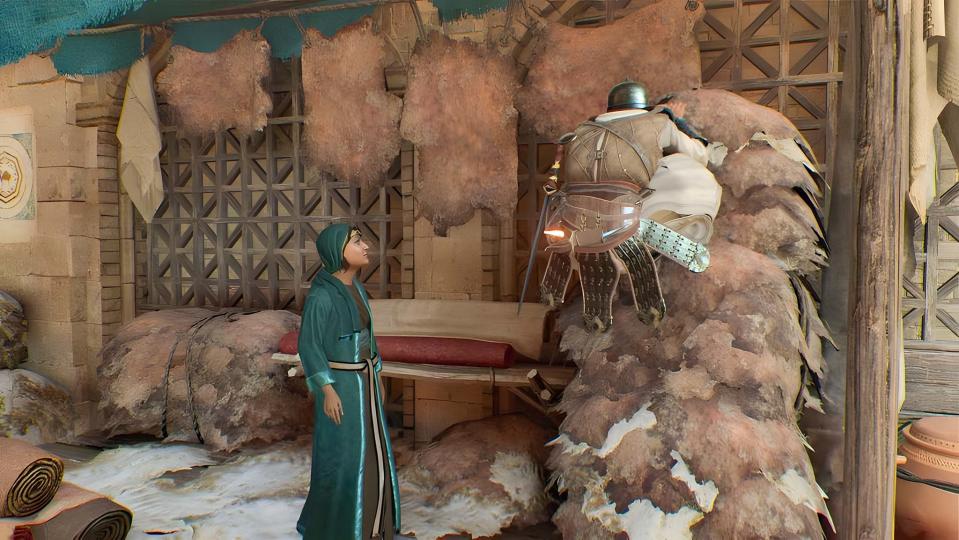
Speaking of mechanics, climbing around the ancient city of Baghdad proved once more to be equal parts liberating and frustrating. When the mechanics work right, climbing up a tall tower or jumping off of a building feels great. However, it's also very easy to aim for one object to mantle up and find yourself awkwardly clambering around something else entirely.
For example, in a busy marketplace, I attempted to climb on top of a stall but ended up latching onto a pile of furs instead and couldn't move up because the tarp overhead prevented me from doing so. Climbing mechanics can also prove frustrating when running away from attacking enemies. I might attempt to make Basim climb up a wall, only for him to jump and get stuck on a nearby railing instead while enemies surround and hit him.
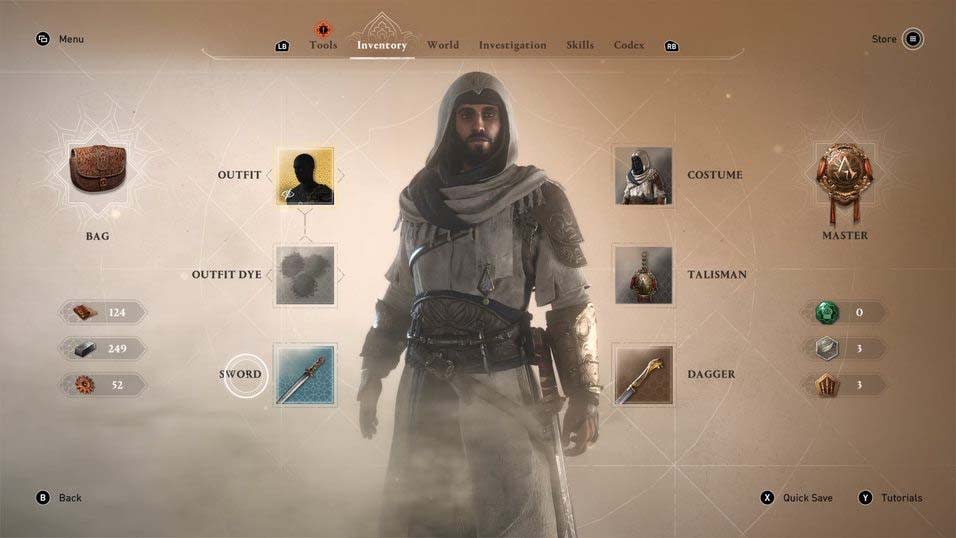
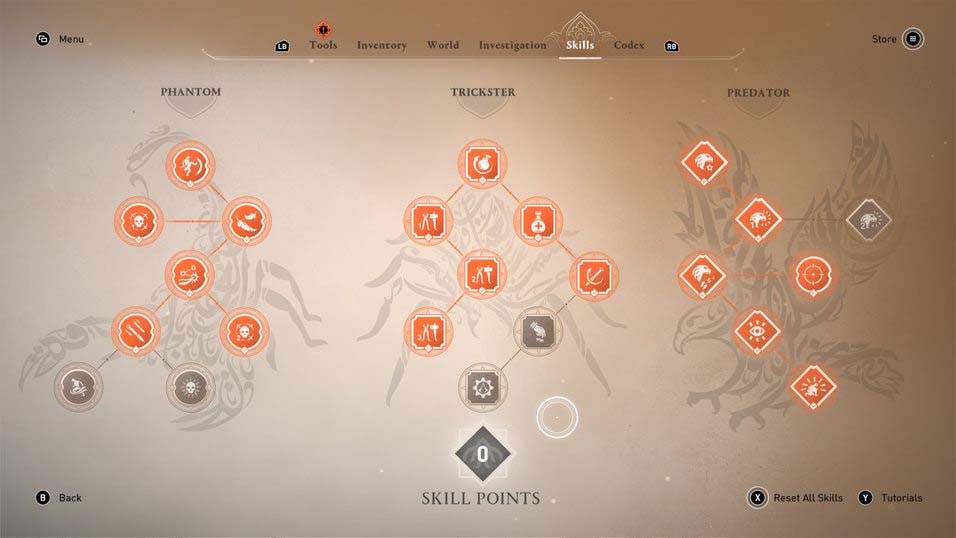
On the subject of enemies, just as with other Assassin's Creed games, Basim can become more powerful depending on what gear he has equipped and what Skills are unlocked in the Skill Tree. This provides a sense of progression as time goes on that makes me feel powerful as I jump through the city and become more adept at carrying out my missions.
There are merchants all around ancient Baghdad, but to unlock new weapons and outfits, players must locate special glowing chests within buildings and figure out how to get to them. This usually proves to be a fun puzzle to solve that requires some thinking. Once obtained, players can upgrade gear via merchants if they have the proper materials to do so. Discovering outfits or gear alluding to previous Assassin's Creed games always proved to be a fun reward. I gotta say, running around in Bayek's iconic clothing from Origins made me smile and also made me want to replay the older game.

Mirage's combat is very satisfying if done correctly. Players can unleash a quick attack, let loose a charged attack, counter an attack, or dodge. You need to watch your enemy closely and determine what action makes sense based on the queues your opponent gives you. Using stealth maneuvers lets you sneak up on an enemy and quietly assassinate them without fuss. Plus, if you unlock all of the tools at Basim's disposal, you can hurl traps, put people to sleep with blowdarts, distract enemies with noise makers, disguise yourself with smoke bombs, or throw knives at distant enemies. Plus, you can upgrade these tools as time passes, which all work together to make you a far more efficient assassin.
As I've said before, it really isn't all that different from the gameplay of past Assassin's Creed games. Still, these familiar stealth mechanics, combat options, equipable items, unlockable skills, and a range of tools all work together to provide a satisfying experience that kept me engaged until the end.
AC Mirage: Accessibility
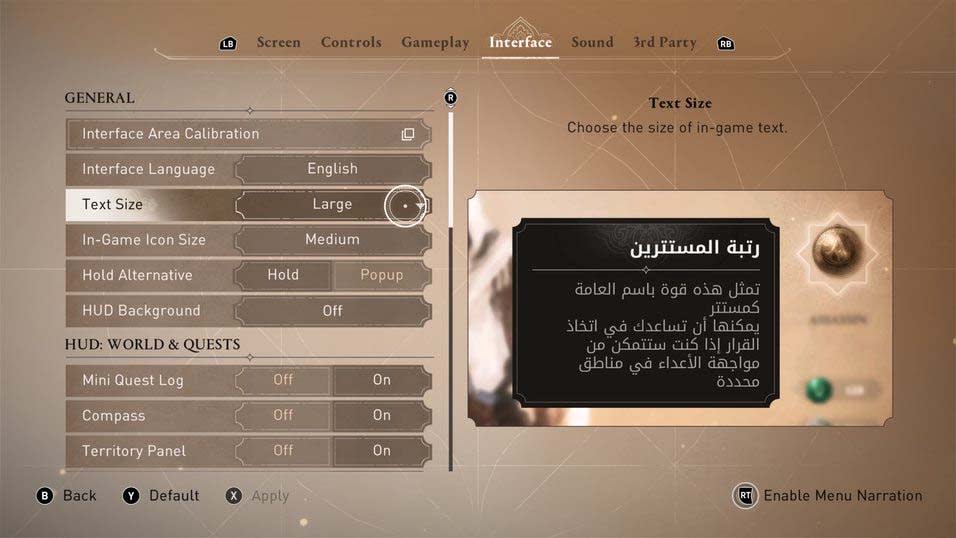
Mirage does a fair bit in accessibility, but it definitely could do more. As it is, there are colorblind modes for Tritanopia, Deuteranopia, and Protanopia to help players see visual elements better. Xbox players can also remap Xbox controller buttons or play with a mouse and keyboard to get the desired controls they want out of the game. Text options are also very large, making captions, subtitles, or menu options easier to read.
Regarding approachability, Mirage can be played in Easy, Normal, or Hard mode, and players can swap between these modes at any time from within the Options menu. The ability to turn on Aim Assist, turn off Screen Shake, or guarantee pickpocketing is also available to make the game more enjoyable to a broader audience.
AC Mirage: Should you play it?
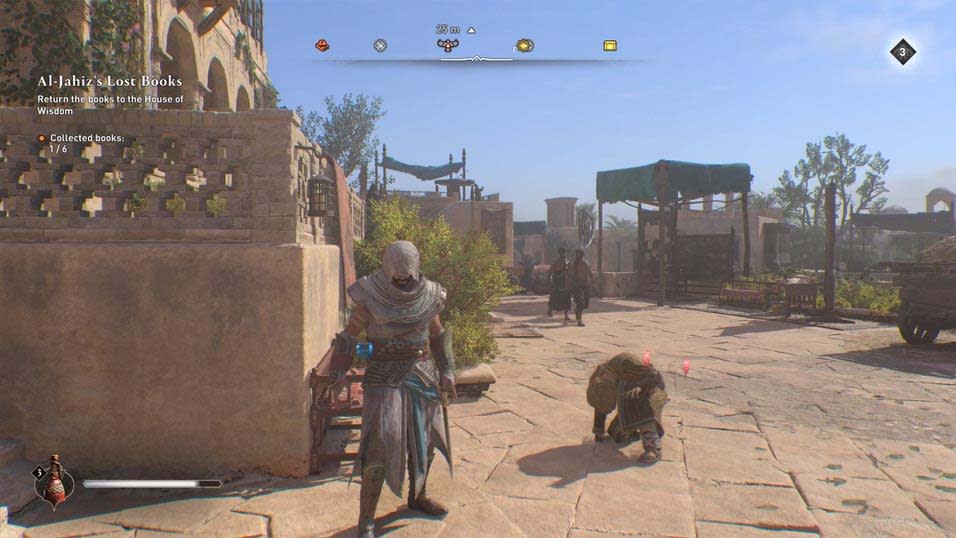
You should play this if ...
You should not play this if ...
It only took me roughly 20 hours to beat Mirage, but I could have spent a few more if I went back and tried to 100% it. I really do love that it isn't nearly as long as Valhalla, with a more compact story that doesn't stretch on with too many redundant sidequests. The city of ancient Baghdad is an exciting and vibrant place to explore, which makes it fun to climb around on walls and towers when completing my objectives. Plus, figuring out how to infiltrate buildings to find gear or complete missions provides a fun puzzle each time.
If you're new to Assassin's Creed or are already a fan of the series, you should check this game out as it provides a satisfying experience, even if it's similar to the games that came before it. It just manages to do this without stretching on for too long.
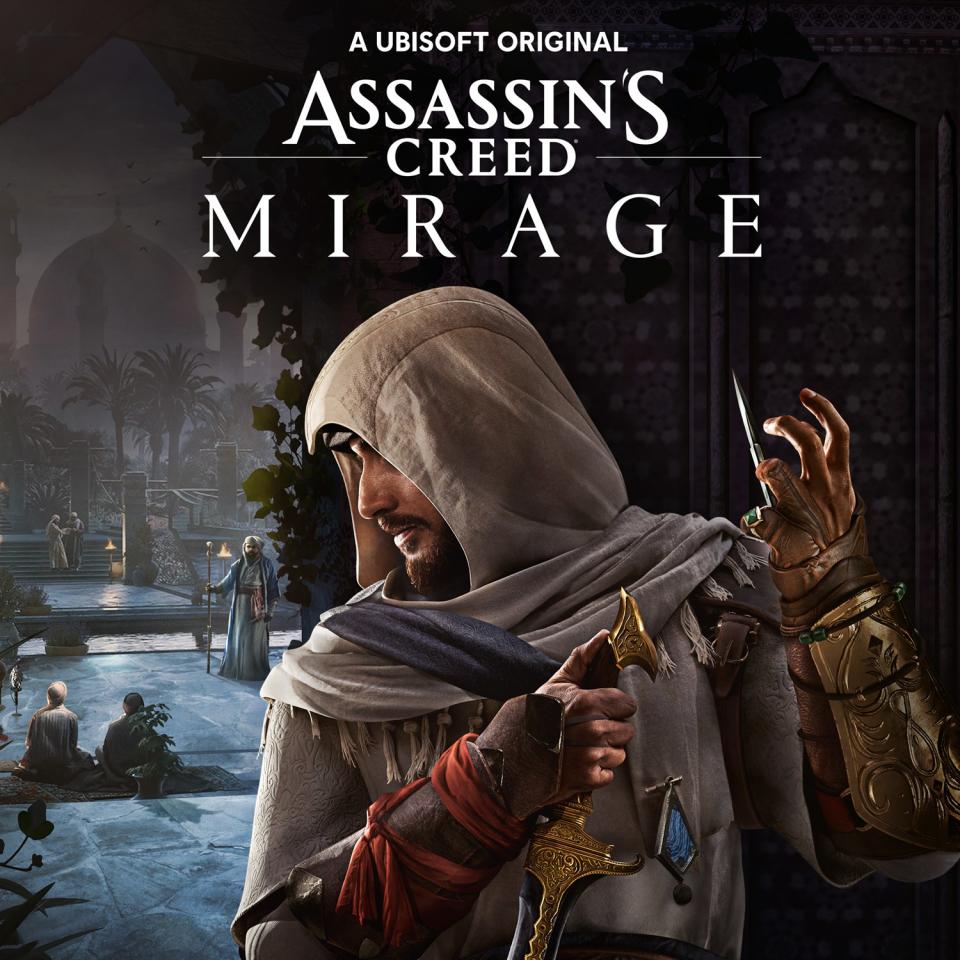
Assassin's Creed Mirage
Learn about the origins of Basim ibn Is'haq while running through the streets of 9th-century Baghdad. The Order oppresses the people, and it's up to The Hidden Ones to unmask these exploitative leaders and bring justice for everyone.
